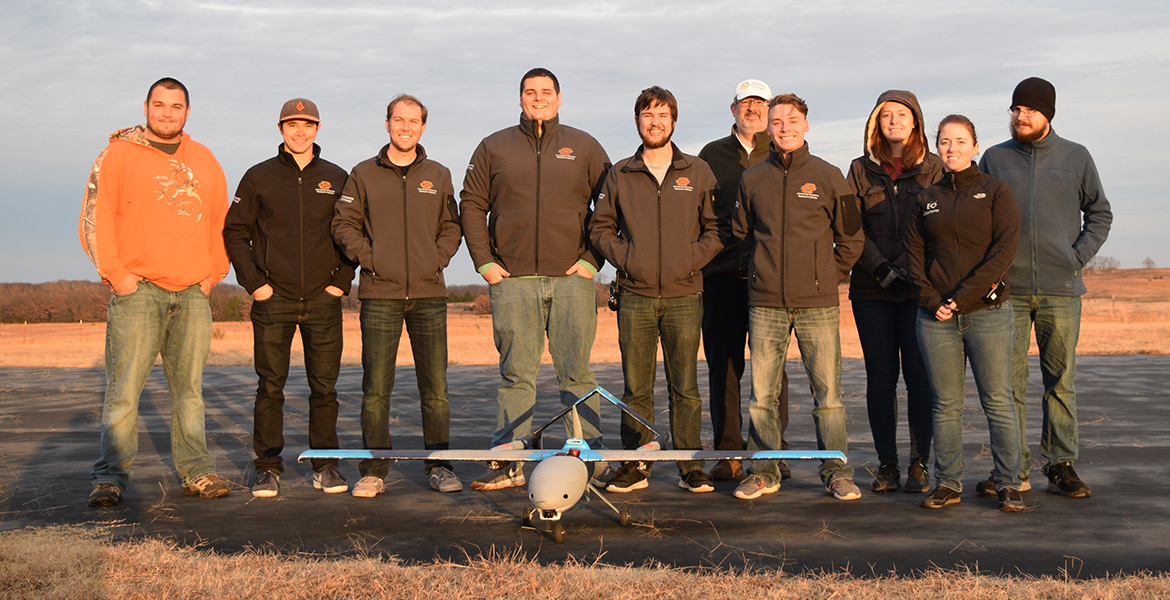
Tier 1 Research Initiatives: OSU designates research areas aimed to improve societal needs
Thursday, March 14, 2019
Oklahoma State University’s research has always had its foundation in addressing societal needs. Today, that foundation is becoming the focus, with initiatives including drone usage and the opioid crisis being designated for focused investment and growth in the coming years. OSU is labeling these areas as its Tier 1 Research Initiatives, to emphasize that the efforts represent Timely, Impactful, Engaged Research (TIER).
“OSU’s research has always reflected our land-grant mission to serve society,” said President Burns Hargis. “Our Tier 1 Research Initiatives represent a commitment to Oklahoma that we intend to use our research strengths to make a major difference in areas of vital importance to our world.”
OSU Vice President for Research Dr. Kenneth Sewell considers the Tier 1 Research Initiatives cornerstones of the university’s overall research enterprise.
“We have amazing researchers all across the spectrum of academic departments and disciplines at OSU,” Sewell said. “That’s why OSU is among the nation’s top tier of research universities, according to the Carnegie classifications. But our Tier 1 Research Initiatives take our public mission to a higher level by coordinating across disciplines to tackle some of society’s challenges head-on.”
Two existing research centers are receiving this designation immediately based on the public impact of their missions.
The Drone Initiative: Drones Serving Our Safety and Environment is a part of OSU’s Unmanned Systems Research Institute (USRI).
“Drones are becoming commonplace in how we think about national defense, law enforcement, and even for the future of retail,” said Jamey Jacob, USRI director. “But the potential for drones to make positive contributions in health and safety is vast yet underdeveloped.”
Led by engineering faculty with collaborators from across OSU, this initiative develops applications, tools and aircraft platforms for using unmanned aerial vehicles in weather forecasting, environmental monitoring, firefighting and other health and safety arenas.
The Opioid Initiative: Addressing the Opioid Epidemic is the research arm of the Center for Wellness and Recovery, based at the OSU Center for Health Sciences (OSU-CHS) in Tulsa. Led by researchers spanning multiple disciplines at OSU-Stillwater, OSU-Tulsa, and OSU-CHS, this initiative focuses on understanding the causes, effects and effective interventions for opioid addiction — a major public health crisis in Oklahoma and across the nation.
“Addressing the opioid crisis with science-driven tools is the ultimate goal,” said Dr. Charles Amlaner, OSU-CHS vice president for research. “And we are excited to have OSU-CHS lead this collaboration with our OSU colleagues.”
OSU’s designation of Tier 1 Research Initiatives will occur in several phases. Additional Tier 1 Research Initiatives will be selected based on an ongoing idea competition. Last fall teams of OSU and OSU-CHS researchers submitted ideas for thematic areas that could comprise the next designated initiatives. Four teams have been selected as finalists, receiving planning grants to vie for the designation.
The Carbon Initiative: Capture, Store, Reduce, Reuse
Finding economical and effective technologies to sequester, store and reuse carbon dioxide (CO2) is vital to mitigating the state’s carbon footprint. OSU’s researchers have a critical mass of relevant expertise partnering with industry, government agencies and other Oklahoma stakeholders to meet this important challenge.
The Microbiome Initiative: Connecting the Microbiome to Health
The complexity of the microbiome — intricate biological communities inside humans, animals, and even the soil — is vast. Their connections have the potential to benefit health and well-being. But rigorous science is required to ensure that medical, veterinary, dietary and soil-management interventions targeting the microbiome are effective and well-understood. This theme brings together OSU experts from biology, human and veterinary medicine, computer science, mathematics, behavioral sciences, social sciences and engineering to better understand microbiome-associated diseases and processes that impact health.
The Water Initiative: Ensuring Sustainable Water for Oklahoma
Without technological improvements, Oklahoma will need more water by 2060 than is available, and water quality is at risk in many parts of the state. Ensuring Oklahoma’s water sustainability and security are the ultimate goals of this initiative to develop a comprehensive water technology research program at OSU. The technologies that emerge from this program will allow Oklahomans access to previously unavailable water supplies and optimize water management.
The Rural Initiative: Ensuring the Future of Rural Oklahoma
The future of many rural communities in Oklahoma, as well as elsewhere in the U.S. and around the world, is jeopardized by natural resource degradation, climate change, drought and sociocultural trends. Those threats are draining away human talent, expanding a technology gap between rural and urban society and leading to rural population losses. This initiative will identify and create ways to enhance the natural, human and technological capital in rural areas by bringing together interdisciplinary research teams to conduct community engaged, solution-oriented research on behalf of rural Oklahoma. The resulting solutions are likely to have global applicability.
OSU expects to announce which of these will be designated as Tier 1 Research Initiatives this summer. The designated teams will be supported by OSU and OSU-CHS with seed funds, laboratory equipment, new hires, student and staff support and assistance in seeking external grants and partnerships.
“Many of the faculty driving our Tier 1 Research Initiatives are among OSU’s most productive experts,” Sewell said. “They will leverage OSU’s investments to bring in resources from federal agencies, foundations, and community partners, accelerating OSU’s impact on these important problems.”
Additional information about OSU’s Tier 1 Research Initiatives can be obtained at research.okstate.edu.
